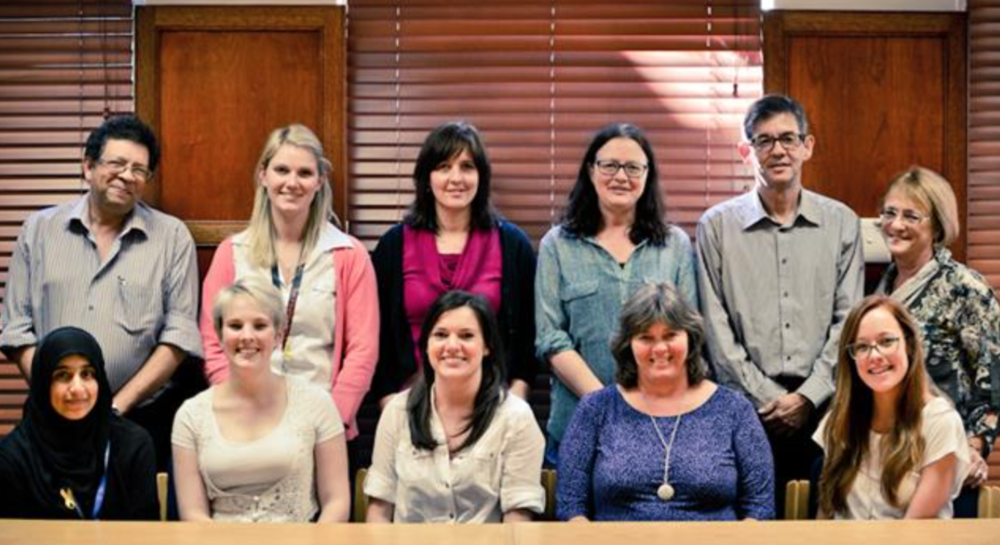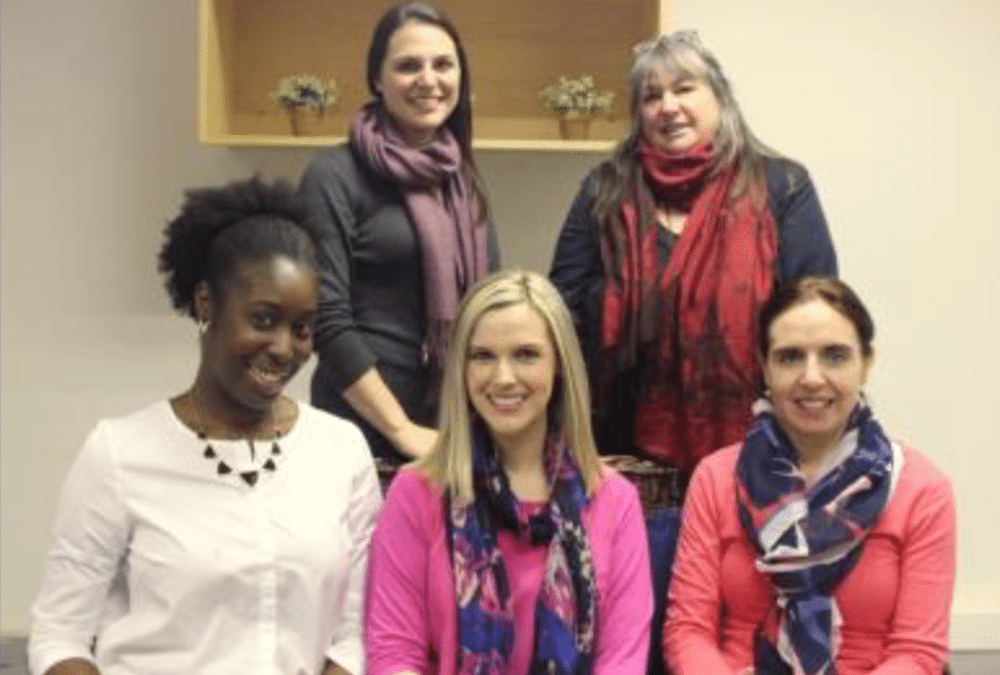This is the eighth installment in our series, “Trailblazing Genetic Counselors”, in which we highlight genetic counselors who are pioneers in the field. Genetic counselors are health professionals with specialized graduate degrees and experience in the areas of medical genetics and counseling. Genetic counseling is a rapidly growing field offering professionals a wide range of opportunities, which we explore in this series. Learn more on the National Society of Genetic Counselors’ new website, aboutgeneticcounselors.com.
To keep updated with conversations and news in genetic counseling you can subscribe to our Twitter list featuring the latest updates from over 380 professionals in the field, all in one stream.
In this episode, we highlight genetic counselors who practice in geographical areas of the world in critical need of more genetic counseling services. Our first genetic counselor is Maggie Miller, M.S. who practices in Anchorage, Alaska. The second feature is of a group of genetic counselors in South Africa.
 Maggie Miller is a genetic counselor at Providence Alaska Medical Center in Anchorage, Alaska
Maggie Miller is a genetic counselor at Providence Alaska Medical Center in Anchorage, Alaska
Genetic counseling is my dream career. I stumbled upon the field when my sister received genetic counseling for a surprise pregnancy at age 41. I was a 19-year-old college student who had bounced around most of the medical career options, and was struggling to find something that kindled my passions.
I was born and raised in Alaska and always planned to create a life for myself here. Another of my (three) older sisters is an oncology nurse and I was amazed by the work she and her colleagues did, but couldn’t quite see myself in their shoes.
While attending graduate school I fell in love with cancer genetics; the idea that I could help to prevent cancer was so positive and empowering. I learned that Providence Alaska had recently received Commission on Cancer certification as a community cancer center, which requires access to oncology genetic counseling. It was a dream come true, a job available in the place I wanted to be, doing exactly what I wanted to do.
For the past 12 years I have been providing oncology/hematology genetic counseling at Providence Cancer Center in Anchorage. My practice has grown from 50 patients in my first six months to nearly 500 patients each year, with a (unfortunate) four-month waiting list at this point.
We began recruiting for a second genetic counselor in February 2016. After a year of searching, we were able to connect with a graduating student who I’m happy to announce will begin July 31, 2017. As you can imagine, the waiting list continued to grow as we searched for a perfect fit.

This winter, I was approached by the Genetic Support Foundation to discuss the option of Tele-genetic services to help us deal with the backlog while we waited for the start of our new employee. It has been a wonderful and (rather seamless) partnership, as I was already providing telephone genetic counseling services due to the large and complicated geography of Alaska.
I am anxiously awaiting having a partner; it’s rather lonely being the only oncology genetic counselor in the state. I’ve been lucky to develop relationships with colleagues all over the United States via referrals and connections with me through laboratory work. Thankfully I have been able to stay connected with my classmates and supervisors.
Now that our program is growing, I hope to develop into the areas of colorectal cancer referrals, gynecologic referrals prior to non-emergency hysterectomy, and pedigrees on all pediatric cancer patients.

We hope to offer the My Life Our Future study, which provides free genetic testing to individuals with bleeding disorders and to their at risk relatives. I’m excited to be able to play such an important role for patients and families and understanding bleeding disorders.
Another area that we have begun to look into, but requires much further and deeper study, is colorectal cancer and gastric cancer in Alaska Native patients. Patients with Alaska Native ancestry are two times more likely to develop colon cancer, and are three times more likely to develop gastric cancer compared to Americans of European ancestry. To date, even using large, multi-gene panels, there have been no founder mutations identified. Theoretically, there may be a mutation that is not currently identifiable, although it is suspected that a familial pattern is at fault.
The community has taken action and is offering colon cancer screening to people of Alaska Native ancestry beginning at age 40. However, this resource is finite and often requires travel in from remote Alaska to complete the screening. A familial risk modeling system could greatly assist in determining who truly needs early colonoscopy and how frequently.
When I first started as an oncology genetic counselor I also provided some general pediatric genetic counseling. At that time our state had one half-time genetic counselor providing pediatric general genetics and a private perinatology office had a second genetic counselor working three-quarter time. When my colleague starts at the end of July, Alaska will have five practicing genetic counselors offering perinatal, general pediatrics, oncology, hematology, and adult genetics services.
Alaska is full of geographic, cultural, and language-barrier challenges which helps make this a wonderful and diverse place to live. However, Alaska being one-fifth the size of the continental United States also means that patients and families have to face a lot of travel to get to Anchorage, our largest city, for care. Our pediatric genetics clinic contracts for geneticists from Oregon to see patients every two months for two days in Anchorage and a third day in one of six remote locations throughout the state. I have been providing telephone-based services to help alleviate travel needs, and we hope to offer more satellite clinics in the future as our genetic counseling workforce grows.
Despite some of the challenges of providing care here, genetic counseling continues to be my passion and it’s exciting to imagine how we will continue to expand and develop new ways to provide this valuable service to our communities.
The global recommendation to provide genetic services for developed countries is having 3 medical geneticist and 10 genetic counselors per million population. However South Africa only has 0.2 medical geneticists and 0.4 genetic counselors per million*.
National Health Laboratory Service and The University Witwatersrand‘s Genetic Counseling Manager, Shelley Macaulay, explains how different areas are impacted by this disparity of genetic counselors, “Out of 9 South African provinces, 5 do not have genetic services: Limpopo, Mpumalanga, North West, and the Eastern and Northern Cape. There is a dire need for more genetic counsellors in South Africa but sadly, the rate limiting factor is availability of jobs.”
We are striving to change these statistics with genetic counseling training centers at University of Witwatersrand and University of Cape Town. Macaulay shares that challenges the programs face include “lack of paid internship positions and job availability due to a lack of funding in academic and government sectors.”
 South Africa’s University of Witwatersrand hosts 4 Genetic Counselors, 1 Genetic Nurse plus 6 Medical Geneticists.
South Africa’s University of Witwatersrand hosts 4 Genetic Counselors, 1 Genetic Nurse plus 6 Medical Geneticists.  University of Cape Town, in South Africa, team includes 2 Genetic Counselors and 2 Medical Geneticists.
University of Cape Town, in South Africa, team includes 2 Genetic Counselors and 2 Medical Geneticists.
We definitely need more awareness in the health sector; there is very little genetics in the nursing curricula and therefore very few nurses at the government (public) hospitals are recognising which patients should be referred for genetic counselling, despite giving in-service training. The turnover of doctors in the government hospitals is so rapid, that despite giving in-service training within the hospitals to the paediatricians and obstetricians, very few of them refer to our service. Increasing the awareness of our genetic services at the local hospitals is a high priority, and we are currently creating posters and leaflets to distribute to the various clinics at the hospitals, both private and public. We have a major problem with job availability and paid intern posts; with more counsellors, we could do more outreach clinics and reach a vast number of patients.

The awareness level of genetic counseling is mostly amongst patients who have a child/family member with a genetic condition and who have been referred to our clinics. Sometimes by word of mouth from patient to patient. Certainly limited at the local authority clinics. Certain groups like the Albinism Society, hold regular meetings in the communities, so there is good awareness of this condition; however, we still have very few referrals from this group. The Down syndrome support groups also run regular meetings in various communities, but once again, it is only those with affected children who tend to be fully aware of genetic counseling.
All genetic counselors in South Africa are generalists; although most have personal “specialities” and preferences, all conditions are seen by all counsellors.
- Pediatrics
- Including Down syndrome, albinism, haemophilia, sickle cell anaemia, spinal muscular atrophy, Duchenne muscular dystrophy and many other childhood conditions
- Prenatal counselling and testing
- Postnatal with fetal abnormalities
- Cancer clinics in private and public
- Adult conditions including Huntington’s disease, spinal cerebellar ataxia
Resources for ourselves and our patients are limited, particularly in the public sector due to financial constraints. However, our private patients have access to a large amount of testing options both locally and internationally. The hospitals do have resources in that they have specialists in all fields including physiotherapy and occupational therapy, audiology and speech therapy, ear nose and throat specialists, cardiologist, dermatologist etc, so we can refer patients in the public sector to these specialist clinics.
*Recommended by the Royal College of Physicians UK & the Association of Genetic Nurse and Counsellors UK (AGNC).
Check back for the next episode of “Trailblazing Genetic Counselors” and read our previous episodes here! Nominate a colleague who deserves the title by tweeting us at @mygenecounsel or emailing at ellen@wordpress-643246-2098057.cloudwaysapps.com.

